
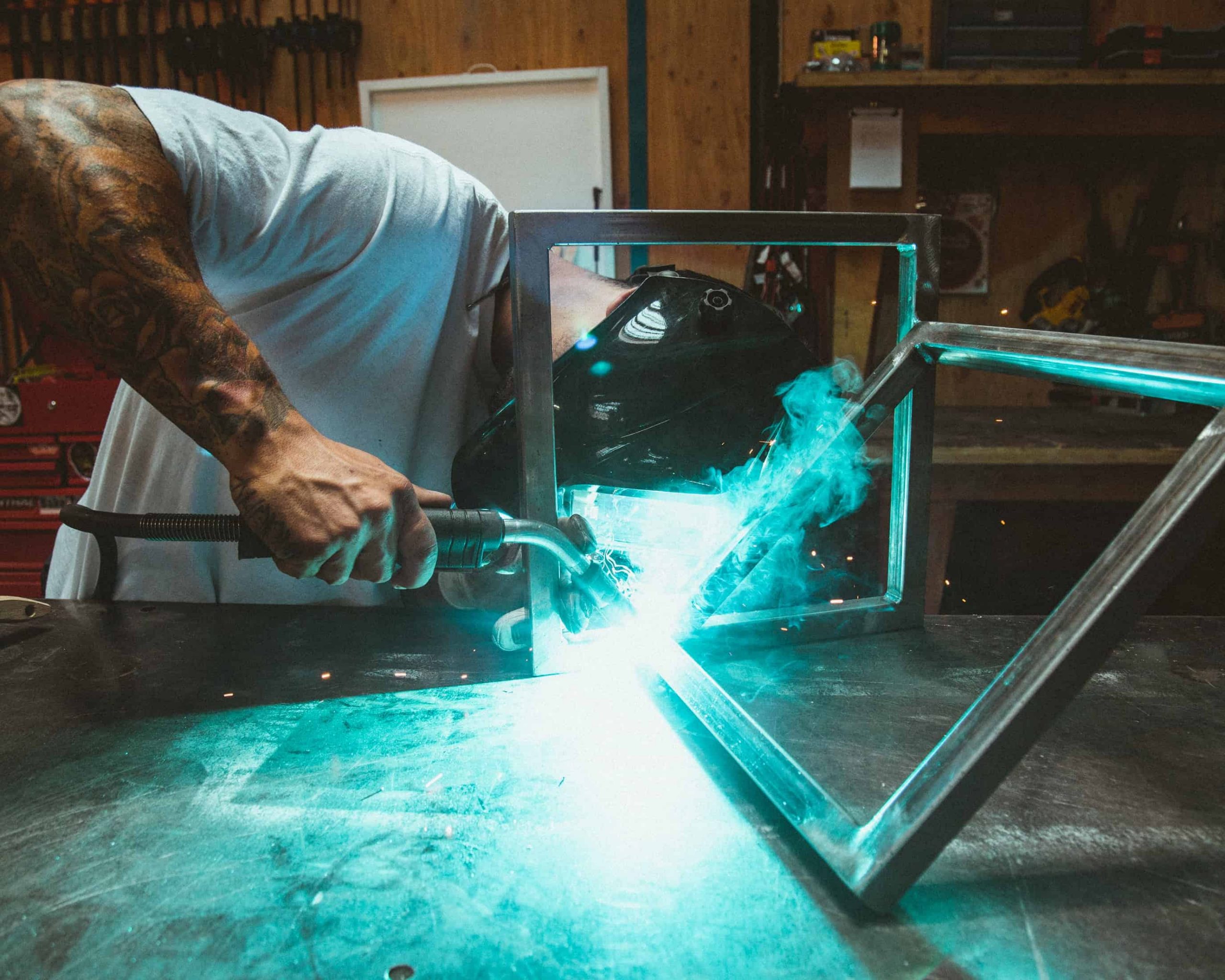
Ever hear the saying, “A good welder can weld anything from the crack of dawn to a broken heart.” Not without the best mig welder they can’t.
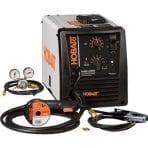 Hobart Handler 210 MVP MIG Welder
Hobart Handler 210 MVP MIG Welder
Runs on both 115V and 230V power outlets
Easy to install and use
Low duty cycle of 20%
A bit noisy
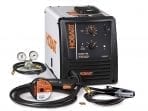 Hobart 500559 Handler 140 MIG Welder 115V
Hobart 500559 Handler 140 MIG Welder 115V
Easy to set up - comes MIG ready
Easy controls and excellent instructions
Heavy for a home use machine
Runs only on 120V only
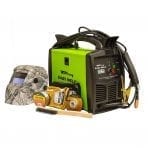 Forney Easy Weld 29901
Forney Easy Weld 29901
Comes as a complete starter kit
Affordable
Lacks versatility - can only run on 120V
Produces a lot of splatter, especially if the subject isn’t polished
Very simple to set up and use
Dual voltage inputs of either 120V or 230V
MIG Series Gas-Less Flux Core Wire Welder Welding Machine
Includes thermal safety protection and can plug anywhere with a 115V outlet
Lightweight design
Inexpensive
Low duty cycle of only 10% hence not suitable for heavy work
Lacks versatility with support for flux core welds
Lincoln Electric K2185-1 Handy MIG Welder
Welds both MIG (shielding gas sold separately) and flux-cored
Versatile with the ability to run on shielding gas or flux core on 115V
Quality build and comes MIG ready
Low duty cycle of only 20% hence cannot be used for extended periods without overheating
The regulator does not come with a gauge hence difficult to tell the gas levels
Commercial MIG 130 AC Flux Core Wire Automatic Feed Welder
Includes automatic thermal safety protection
Inexpensive
Compact and lightweight design
Creates a lot of spatter especially without proper grounding
The tip stays live when the trigger is released
Includes both MIG and flux core weld capability
Lightweight design with many functionalities
Ambiguous user’s manual and wanting customer support
No extra tips for sale from the company
10 Handy MIG Welder Reviews in 2026

He built a house with his own hands. He can definitely distinguish good tools from bad ones and knows the secrets of repair.
Wayne C. Meyers If you want to start controversy amongst welding professionals and enthusiasts, all you need to do is start a conversation about which brand of welding machine is the best in the market. Considering the sheer number of welding machines and welding processes available, selecting the best MIG welder that suits all your needs can be a confusing and difficult decision.
If you want to start controversy amongst welding professionals and enthusiasts, all you need to do is start a conversation about which brand of welding machine is the best in the market. Considering the sheer number of welding machines and welding processes available, selecting the best MIG welder that suits all your needs can be a confusing and difficult decision.
Many people believe that welding is a skill only best left to the professionals.
They are mistaken.
There are user-friendly machines out there that even the most inexperienced user can learn to handle, as you shall discover in our comprehensive review. Let’s get started…
To come to our final choices for the best MIG welder, we considered the price, power input/output, safety features, quality control, customer service, versatility, portability, ease of use, accessories, and many more.
Additionally, we read hundreds of online reviews from verified buyers and gathered input from professionals in the welding industry.
It gets better…
Just to make sure, we also tested these machines ourselves.
Rest assured…
As long as it made it here, be sure it does what it is supposed to. All you have to do is find the right one for you.
We found the Hobart Handler 210 MVP MIG Welder to be an excellent wire feed welder that’s easy to handle. It weighs 87.5 pounds and is able to run on both 115V and 230V outlets. This versatility comes in handy when you want to switch between welding thin and thick metals.
Besides the shielding gas, you can also use the 210 MVP with flux core. We were able to weld 24-Ga. to 3/8-in steel comfortably in a single pass. The unit contains seven output voltage settings and a dual-groove rapid change drive roll.
This unit made it to our list because it has everything to get you started, it produces deep penetration, a smooth arc, and it can handle heavy jobs.
The one things we noticed…
It’s a bit heavy. But, this is to be expected with a welder of this caliber. We recommend getting a cart if you’ll be moving around.
The unit is fitted with a powerful fan inside which can get distracting because of the noise, but this is not too much a deal.
If you don’t have a welding helmet, check this link out. A nozzle gel will also come in handy for cleaning up the splatter.
Runs on both 115V and 230V power outlets
Easy to install and use
Low duty cycle of 20%
A bit noisy
The Hobart 500559 Handler MIG Welder performs like a champ, even if you’re inexperienced. It’s easy to use and takes just a few minutes to set up.
Explains why it’s so popular!
(Especially with hobbyists and DIY-ers.)
Weighing 65.3 pounds, it’s a little heavy but very sturdy. We found this machine quite versatile, being able to run both flux core and gas. It performs at its best when working with thinner metals such as auto body, farm, art, and house repair projects.
It will also penetrate mild steel effectively. This makes sense since it runs on 120V.
The regulator and all connecting parts fitted in this welder are of good quality and the ground clamp is sound. This is important for creating smooth welds.
Be sure to get an extra spool of wire since it only comes with a small one. You can also invest in a nozzle gel from Hobart to reduce splatter and an auto-dimming helmet for safety. Otherwise, if you need a lightweight and reliable welder, the Hobart 500559 is a great choice.
Easy to set up - comes MIG ready
Easy controls and excellent instructions
Heavy for a home use machine
Runs only on 120V only
The Forney 29901 MIG Welder is a simple, well-built machine. Weighing 57 pounds, it arrives with a small wire brush, two pairs of gloves, a grinding wheel, and two extra tips. It’s very quiet when switched on and easy to use.
We were able to run many spools of wire without any problems and replacing the wire is a piece of cake.
For a hobbyist, the auto-dimming helmet is all you will need to come up with a quality weld. However, you can still upgrade with a better helmet.
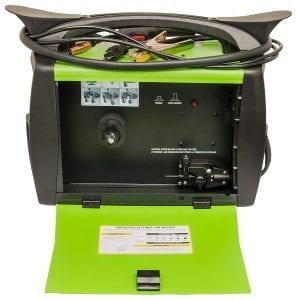 Unfortunately…
Unfortunately…
This machine has a rather low duty cycle of only 20%. But for the money, it’s still tough to beat. For safety, it’s fitted with a thermal alarm that alerts you in case you exceed your duty cycle.
The Forney 29901 is best suited for do-it-yourselfers who have occasional welding work around the house/farm. It runs on 120V and 125A, meaning it’s best suited for low to medium duty welding.
The kit arrives with pretty much everything you might need to weld, but we recommend getting higher quality flux cored welding wire to be on the safe side.
Comes as a complete starter kit
Affordable
Lacks versatility - can only run on 120V
Produces a lot of splatter, especially if the subject isn’t polished
The 2017 Everlast PowerMIG is a feature-rich MIG welder that packs a lot of power and versatility. Weighing only 37 pounds, this highly portable MIG welder is also capable of stick welding and using flux core in case you need to switch.
It comes with many controls, accordingly, we found it easy to regulate the arc characteristics whether in MIG or Stick modes.
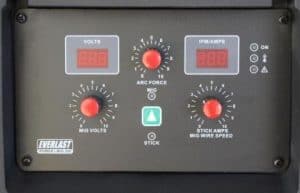 What really impressed us?
What really impressed us?
We noticed this welder starts the shielding gas automatically before feeding the wire and continues the gas flow for a moment after the welding has stopped. This reduces porosity and improves the quality of the results significantly.
We found the burn back control feature to be useful during each restart since it reduces the amount of trimming needed on the wire. The digital controls also give you the exact readings of details such as wire speed and voltage.
What’s more…
This welder has a dual voltage design, meaning it can be used with both 110V and 240V outlets depending on preference. The kit includes an air regulator, hoses, and an extra wire feed wheel for the core flux wire.
The 2017 Everlast does not come with a helmet, but you can check this one out. Also, to prevent the weld splatter from adhering, you can invest in a great welding nozzle gel.
Digital controls and displays improve ease of use
Capable of stick and MIG welding using both gas and flux core
It has a long design
Does not include a helmet
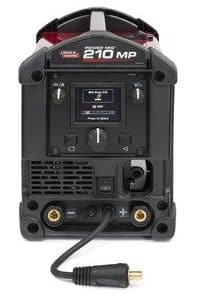 If you’re not a professional welder or have never even welded in your life, then go for the Lincoln Electric Power MIG 210. Using this 40-pound machine, all you have to do is plug-and-play! After prepping your joint thoroughly and a bit of practice to get the hang of the gun, even the most clueless of us was able to weld 3/8” steel easily.
If you’re not a professional welder or have never even welded in your life, then go for the Lincoln Electric Power MIG 210. Using this 40-pound machine, all you have to do is plug-and-play! After prepping your joint thoroughly and a bit of practice to get the hang of the gun, even the most clueless of us was able to weld 3/8” steel easily.
For best results…
We noticed you have to clean up the joints thoroughly and set up a proper ground connection, preferably directly on the pieces you are working on.
This little machine is fitted with Touch Start TIG® technology, which enables it to weld up to 5/2” stick electrodes DC TIG. It’s suitable even for a small shop that needs to be versatile. In all, it supports stick, TIG, and flux cored welding.
If you purchase the necessary accessories (MIG, TIG, flux core, and stick), this little machine can do wonders.
How’s that for versatility?
It comes with a 3-year warranty, but we doubt you’re going to need it.
For better performance get an auto-dimming helmet and nozzle gel for cleaning the splatter when using flux core.
Very simple to set up and use
Dual voltage inputs of either 120V or 230V
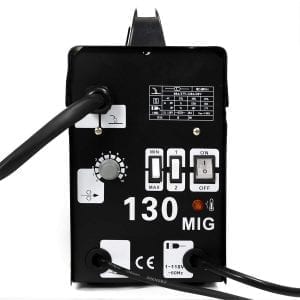 The MIG Series Gas-Less is a flux core wire welder that’s excellent to keep around the house.
The MIG Series Gas-Less is a flux core wire welder that’s excellent to keep around the house.
Especially after considering the price.
It weighs only 36 pounds, and once you learn how to handle this machine properly, you can make some pretty decent welds. Make sure to practice and buy all the consumables you need, including an auto-dimming helmet and nozzle gel for the splatter, considering this is a flux core welder only.
We were able to weld ¾” of steel easily using this little machine, but it’s not the best you’ll find out there. It lacks versatility since it can only run on 115V and weld with flux core only.
However, we think it’s the perfect fit for anyone who wants to try their hand at MIG welding or even for professionals who can produce neat results with flux core.
Lightweight design
Inexpensive
Low duty cycle of only 10% hence not suitable for heavy work
Lacks versatility with support for flux core welds
The Lincoln Electric K2185 is a user-friendly MIG welder that plugs into a 115V outlet at 120 amps. It comes in a lightweight design, weighing only 26 pounds.
It contains four voltage settings that make it easy to set the right welding conditions and a continuous wire feed speed adjustment system.
We found this machine to be perfect for auto welding and home repair.
The kit comes ready and includes MIG gun and cables, a clamp, gas regulator, hose and nozzle, spool of solid wire, a hand shield, and contact tips.
One conspicuous issue with this welder…
The nozzle does not have a gauge, making it hard to know when you’re almost running out of shielding gas. You might have to fit one on your own.
Other than that, it performs excellently even when welding thick material. It produced smooth, flat, and deep welds. It can plug anywhere making it handy. In fact, we tried it with different outlets and it did not pop any breakers.
A word of caution…
It comes with a low-quality shield, so you might want to invest in a better auto-dimming helmet and a nozzle gel for cleaning the splatter when using flux core.
Versatile with the ability to run on shielding gas or flux core on 115V
Quality build and comes MIG ready
Low duty cycle of only 20% hence cannot be used for extended periods without overheating
The regulator does not come with a gauge hence difficult to tell the gas levels
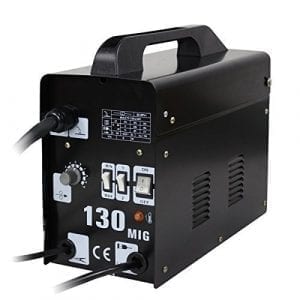 The Super Deal MIG130 Welder is an outstanding flux core MIG welder perfect for the occasional welder. It weighs only 38 pounds and is made of high-quality material making it easy to handle.
The Super Deal MIG130 Welder is an outstanding flux core MIG welder perfect for the occasional welder. It weighs only 38 pounds and is made of high-quality material making it easy to handle.
For a flux core welder, it doesn’t get any better than this. It’s extremely easy to use and can handle all the small jobs around the house or farm.
The wire speed is set automatically depending on the voltage settings and the overheat protection is handy in case you get carried away.
From experience, you should invest in a sound extension cord to prevent your breakers from popping.
Wait, there’s more…
Another thing you should ensure while using this welder is that your joints are clean and the ground is set up properly. Otherwise, it will affect the quality of your weld, leaving a lot of spatter with little penetration.
To be honest…
It would be a good idea to invest in some nozzle gel. The mask included in the kit is also not of good quality, and you might want to invest in an auto-dimming helmet.
Inexpensive
Compact and lightweight design
Creates a lot of spatter especially without proper grounding
The tip stays live when the trigger is released
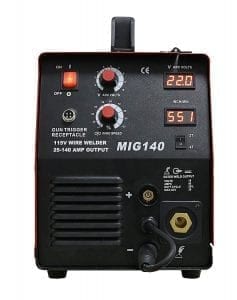 The Lotos MIG 140 is a 54-pound machine that easily connects to your standard home power outlet. In our experience, she runs a perfect bead of weld and is natural to operate.
The Lotos MIG 140 is a 54-pound machine that easily connects to your standard home power outlet. In our experience, she runs a perfect bead of weld and is natural to operate.
The accompanying accessories are not the best you will find out there, and you might want to invest in a better helmet, nozzle gel, extra spool wire, separate spool gun for aluminum etc.
The wire feed runs smoothly even in non-ideal positions.
We found the digital controls and display fitted in this tool handy for controlling the wire feeder speed and voltage precisely. The ground cable is an upgrade from the previous version, and it makes it easier to switch polarities (-/+).
It also includes an overload thermal protection for safety.
Like the other models in this review, investing in an auto-dimming helmet and some nozzle gel for cleaning the splatter when using flux core would also be a good idea.
Includes both MIG and flux core weld capability
Lightweight design with many functionalities
Ambiguous user’s manual and wanting customer support
No extra tips for sale from the company
The Ready Welder RWII is a handy battery-operated MIG gun that can also run directly with a standard power outlet using the attached AC to DC converter. It’s a handy tool especially if you’re in the public works, maintenance, construction, industrial, or agricultural maintenance where you need to move around and weld in non-ideal positions.
It’s fitted with a cold trigger switch which we found useful since the machine does not arc when the trigger is released--even if connected to power.
In our learned opinion, this product performs just as advertised.
The build quality is great and it produces a flat and neat weld when used correctly.
The only issue we noticed is slow customer service.
Also, be sure to get the necessary accessories such as an auto-dimming helmet and nozzle gel to cover all bases.
Quality build
Able to run on battery for as low as 18V
Poor customer support
Suitable for light duty use only
 Even though you need to get a MIG welder that can handle all the jobs you need it for, you also don’t want to spend your savings.
Even though you need to get a MIG welder that can handle all the jobs you need it for, you also don’t want to spend your savings.
Or wind up with an overly powerful welder that ends up being underused.
Every welder has varying preferences and circumstances, but, there are a few things that everyone needs to consider to land on the most suitable MIG welder.
Take a look at some of them below:
A simple MIG welder fit for DIY projects at home normally runs at 115V. This is enough power to weld thin metals but cannot penetrate deep enough for thicker metals.
There are MIG welders that run at 230V and above to provide a ton of power. Although, most of these are expensive. If you’re unsure about your power needs or are planning to handle a wide range of materials, the best option would be to go for an all-in-one welding machine that can operate at both 120V or 220V and above.
With these machines, all you have to do is to switch from a 120V plug to a 220/240V plug. Most all-in-one units are not as powerful as the heavy-duty MIG welders, but they can save you some money.
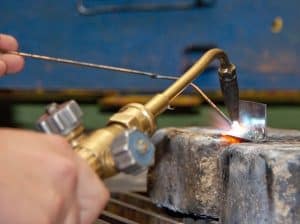 If you’re not using flux-cored MIG wire, the shielding gas needed in your MIG welder will be a regular cost and you should keep this in mind. Therefore, invest in a quality regulator for your machine to save on operational costs and utilize more time on the job.
If you’re not using flux-cored MIG wire, the shielding gas needed in your MIG welder will be a regular cost and you should keep this in mind. Therefore, invest in a quality regulator for your machine to save on operational costs and utilize more time on the job.
The duty cycle of a welder simply describes the number of minutes you can weld continuously before the welder has to cool off, in a ten-minute cycle. If a MIG welder has a high duty cycle of say, 70%, it means you can weld for up to seven minutes before the machine has to cool off in a ten-minute cycle. If it is rated 20% or below, you can only weld continuously for two minutes or less.
For that reason…
If you have thick pieces of metal to weld or you’re planning to weld all day at the workshop, it’s critical to choose a MIG welder with a high duty cycle rating. Even though it will cost you more.
If you weld past the rated duty cycle, your welder will overheat and you may find yourself back here trying to get yet another welder.
To save yourself from such mishaps…
Pick a model that includes thermal overload protection features. It will switch the machine off if things get too hot. This might cost you a bit more, but considering a MIG welder is something that should last you years, the investment is worth it.
Some inexpensive MIG welders out there don’t need a shielding gas as they operate by running flux core wires. The wire melts in the weld, causing the flux to rise to the top, creating a shielding coating on the weld.
Even though affordable…
Flux core cords are not suitable when you need a neat and clean finish. For that, you have to go with a gas-shielded MIG wire.
The good news is…
Most MIG welders in the market are compatible with either flux or gas-shielded MIG cords.
In case you’re welding aluminum using a MIG welder, the wire will often get jammed in the torch as it is being released from the feeder. This issue can be easily avoided by attaching a spool gun to the MIG torch. It will push the wire inches away and prevent the jams. Most units don’t come with one, so consider getting it separately.
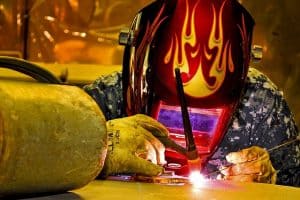 After establishing the purpose of your machine, picking its size, weight and color should be a piece of cake.
After establishing the purpose of your machine, picking its size, weight and color should be a piece of cake.
For instance, if you’re a mobile welder, you might need to go for a powerful, yet light machine that can run on different power outputs.
If you use your machine for DIYs at home, a slightly heavy, yet cheaper model, could suit you well.
Most heavy-duty welders, however, are not portable due to their huge sizes.
Also, look for the quality of the parts used to make the machine before making a purchase. Portable welders should have minimal plastic and movable parts.
 The type and thickness of the metal you want to weld will determine the type and thickness of the cords you will use for the job. As a rule of thumb, the cord should be the same type as the metal you seek to weld.
The type and thickness of the metal you want to weld will determine the type and thickness of the cords you will use for the job. As a rule of thumb, the cord should be the same type as the metal you seek to weld.
For instance, when welding stainless steel, you should use a stainless steel electrode cord for the job. Also, the thicker the metal, the thicker the MIG cord you should use and vice versa.
Let’s take a closer look…
The best MIG welders out there will offer a combination of features in terms of performance, price, ease of use, speed, power options, and so on.
In this article, we’ve ranked the top ten welders after considering all these factors and more. Take a look at the wide range of features in each and choose which one will work best for you.
As already noted in this post, MIG welding is a popular kind of welding, especially for newbies since it’s much easier to learn compared to other forms such as TIG welding.
That being said…
MIG welders build up spatter and slug on the gun especially when using flux cored wires. As a result, they’re also thought of as a dirtier type of welding.
To expand the lifespan of your appliance and maintain good performance, it’s critical you carry out frequent and proper maintenance on your welder.
Take your time in this section to learn all the basics of caring for your MIG welder.
How does a MIG welder work?
MIG or Metal Inert Gas welding is a process that consists of automatically feeding a wire electrode from a spool to the torch. The electrode wire is normally made of the same material as the metal being welded.
The weld occurs inside an envelope of a shielding gas – either pure CO2, pure argon, or a mixture of the two. The electrode conducts current from a standard power supply source and creates an arc on contact with the workpiece. The arc melts the wire into the joint, producing a fast, clean, and high-strength weld.
The process is easy and is currently the standard for welding mild steel in most industrial plants.
There is a special wire known as flux core which can be used to weld with a MIG welder without the need for a shielding gas. This process, nevertheless, leaves a lot of splatter that will need to be scraped off.
Now…
Expert Tips on How to get the most out of a MIG welding machine
 To produce clean, crisp welds, your weld puddle has to be purified as it’s being created. This job is done by the shielding gas. So, ensure you have an adequate amount of this essential ingredient to produce clean welds. The required amount can be different depending on the environment in which you are working in, as well as the surface of the workpiece.
To produce clean, crisp welds, your weld puddle has to be purified as it’s being created. This job is done by the shielding gas. So, ensure you have an adequate amount of this essential ingredient to produce clean welds. The required amount can be different depending on the environment in which you are working in, as well as the surface of the workpiece.
For instance…
Avoid areas with direct moving air such as windy places or working next to a fan. For versatility, we recommend choosing a welder that can handle both flux core cords and shielding gas.
Nonetheless…
Welding with a shielding gas is the best way to ensure little to no clean up after welding.
It is understandable that sometimes, it is difficult to make the work area sparkling clean before welding. Still, you should always try to remove any traces of grease, rust, or coatings such as paint if you want a strong and clean outcome.
An easy way to prep your workstation before and after welding is using a wire wheel on an electric angle grinder to remove any coatings or rust.
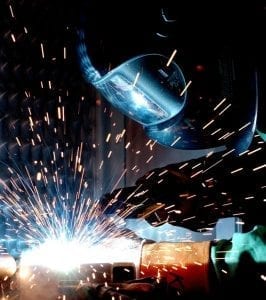 Before using your new welder, you need to ensure it’s set up correctly. Otherwise, you might ruin your valuable project materials. Generally, the best way is finding a metal of the same gauge as your workpiece and practicing on it till you’re satisfied.
Before using your new welder, you need to ensure it’s set up correctly. Otherwise, you might ruin your valuable project materials. Generally, the best way is finding a metal of the same gauge as your workpiece and practicing on it till you’re satisfied.
Another trick is…
Listening to the sound of the arc during welding. It should sound like “crackling bacon” with minimal popping and spitting sounds. Also, make sure the bead is flat instead of raised. When raised, you will need to either turn the feeding speed down or turn up the voltage (heat). This is a common error, especially for beginners.
If you notice your welder is still doing a poor or inconsistent job even after ensuring everything else works correctly, there’s a chance your poor ground is the culprit. Besides having a clean work surface, you also need a clean surface for proper grounding.
A good tip is to weld a piece of metal like a screw on your workpiece to create a continuous ground – try it, it works!
Traditionally, welders were in the habit of using static darkness welding helmets. These are fine if you’re working in a well-lit area, or when you don’t mind the constant flicking of your helmet each time you want to make an arc.
Thanks to technological advancements, however, you don’t need to go through these hardships. You can invest in an affordable auto dimming welding helmet that will allow you to see what you’re doing before, after, and during the weld.
 It goes without saying, there are a lot of hazards while welding and even though most are obvious, some can get neglected easily. To stay on the safe side, invest in the proper attire, including jackets, leather work boots, gloves, long pants etc. These can save you from accidents such as severe burns.
It goes without saying, there are a lot of hazards while welding and even though most are obvious, some can get neglected easily. To stay on the safe side, invest in the proper attire, including jackets, leather work boots, gloves, long pants etc. These can save you from accidents such as severe burns.
Lastly, ensure the workstation is secure by keeping the ventilation open, removing flammable objects, covering open electric wires, and securing the ground.
As a last pro tip, you would be surprised how many more friends you will make after purchasing one of these bad boys. So, when everything is set up and working correctly, it would be a good idea not to let your neighbors know you own a MIG welder.
Otherwise, they’ll start coming by with all kinds of requests and designs for you to work on “together”. Taking up your time and money.
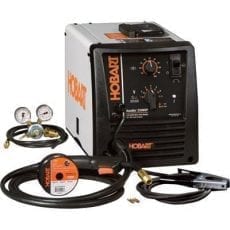
Ever hear the saying, “A good welder can weld anything from the crack of dawn to a broken heart.” Not without the best mig welder they can’t.
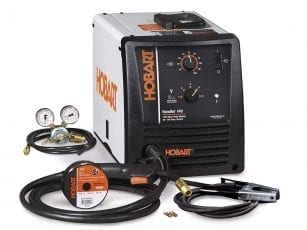
Ever hear the saying, “A good welder can weld anything from the crack of dawn to a broken heart.” Not without the best mig welder they can’t.
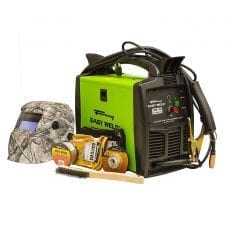
Ever hear the saying, “A good welder can weld anything from the crack of dawn to a broken heart.” Not without the best mig welder they can’t.
The type of shielding gas affects the results of your weld. For instance, if you’re welding mild steel, it’s okay to use shielding gas composed of 100% CO2.
However, in case you need less splatter, a flatter bead profile, or better wetting action, you’ll have to add a more inert gas such as 75-90% argon to the CO2 shielding gas.
Argon reduces the reactivity of CO2 with the molten metal weld, which in turn stabilizes the welding arc.
Poor wire feeding can be caused either by the rolls being too loose causing the wire to slip in the feeder or when it’s too tight, causing the wire to re-shape. It can also be a result of the liner being cut too short and not set correctly in the gas diffuser. Or when the welding wire gets rusty, dirty, or has too much cast.
Overheating may be experienced in case there’s an electrical fault in your circuit or when you’re running your welder beyond its amperage range. If these are not the issues, check if the power cable is of the sufficient gauge and whether the retaining screw on the feeder is tight enough.
Also, check for loose connections especially on the diffusers or tips.
A porous weld may be a result of setting the shielding gas improperly – either too high or too low for a specific joint design.
It could also be caused by poor quality welding cord, or if it’s oily, rusty, or coated. Another reason for porosity is when slug builds up, blocking proper gas flow.
Lastly, you should check for leaks in the gas hose and avoid areas with direct air flow such as open doors or fans.
MIG stands for Metal Inert Gas while TIG stands for Tungsten Inert Gas. The main difference between MIG and TIG welders is that MIG welders work by feeding the welding wire continuously. In a TIG setup, the welder works by slowly feeding long welding rods into the weld puddle.
When your voltage is too high compared to the wire feeding speed, or when they’re both high, you might blow holes in your metal. In such a situation, try reducing the wire feeding speed in relation to the voltage. If your weld looks lumpy, try increasing both the wire speed and voltage since chances are you’re not welding hot enough.
